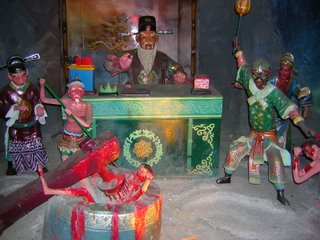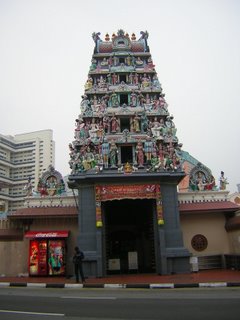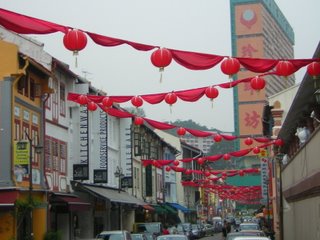The school, just off the Mid Autumn Festival, will be hosting a halloween party, a UN Day, and a Christmas Party all within the span of a month. Not such a bad deal if it didn't require an enormous amount of work from all mentor teachers. We are to organize our students' efforts on all accounts and must prepare them to perform at each of the events. In addition to that, my class is responsible for the Assembly performance during that same week. The assembly is a weekly event and includes both the singing of the national anthem and the recitation of the Pancasila. The latter is the creed of Indonesia and stresses the prevailing 5 sensibilities of the nation. Suffice it to say that it is derived from Soekarno's idea that the strength of the nation must come from unity. Unity was so important in the formation of this nation because the land is so diverse and divided. Regions are seperated by sea, for heaven's sake, and people are divided by language, geography, and traditions. Indonesia, once again, was a Dutch concept that incorporated all of the territory they had conquered in the archipelago. It is not a historic idea, there was no ancient Indonesia. The nationalists who founded the country (eductated in Dutch schools) took hold of this idea. The independence movement suffered from a total lack of consensus, and so, since indpendence was all that the various players could agree upon, unity toward that end was stressed and difference downplayed. Since independence, unity is stressed to prevent rupture.
Recent public polling of Indonesians shows that most Indonesians still believe in the Pancasila and do not support political parties looking for either partition, or the implementation of Muslim law "Shariah." Parties advocating the latter are also divided and while the most popular garnered only 8 percent support, the three major Islamist parties all together were supported by roughly 23 percent of those polled. Concerning those who'd prefer to part ways, Aceh is the most vocal these days. One point made in the papers recently is that Aceh's issue is not so much its desire to set up an Islamist state as it is its desire to control its own oil resources. Foreign companies, of course, benefit greatly from the oil of that region while Acehnese are poor and getting poorer. They blame this on economic policies set in Java, and they are right to do so as that is where the policies are set. Even before independence came, there had been a division between Java and the outer islands.
The World System's Theory that speaks of the world as divided between a core and a periphery (and not between first and third worlds) says, basically, that the periphery's purpose is to provide the resources for the economic benefit of the "core." Colonies were set up to do just this (they had other purposes as well, but this was certainly one of them). In the post-colonial period the periphery still provides the core with resources (labour amongst other things!) Java has a history of being both the "periphery" vis a vis its relations to the Dutch, and the "core" in its relationships with the outer islands. Anyway, local control of resources is what drives the separtist movemnet in Aceh and the Islamists know this. They use this issue to rally support for their cause. Thus, free trade between nations has not spread Western ideals to the areas hurt most by the agreements, but rather encouraged support for anti-Western movements. I think the same could be said for much of Latin America.
I've been reading a little about the Iraq situation today and am just stunned by how, really, if one bothers to think about it, the only people who have not declared the Bush administration's policies an utter failure, work in the Bush administration or Tony Blair's office. Not everyone has come to these conclusions in good faith, of course, Congressional Republicans are just clinging to their seats, but most seem to be saying that another course must be taken. That much of what has happened was predictable and predicted by critics of the war seems to go unmentioned in the press. I remember the day after Saddam's statue was pulled down and Minneapolis newspapers were teaming with letters to the editor asking "where are the critics of Bush and the enemies of freedom now?" I can remember these same letters saying that we should not doubt the existence of WMDs as the Bush administration surely knows a jot more that we lowly citizens. To the first point, that event was meaningless in the larger scheme of things and anyone with any understanding of history knew that then and knows it still; to the latter point, well, there was enough information available to the public even then--if one could possibly believe a foreignor like Hans Blix!--that no evidence of WMD existed and even if it did, it did not pose any threat to the people of the United States (the conjunctive point came courtesy of the CIA). Anyway, this war was not a necessary war and we need not argue that point any further as we can all concede this: if it were a necessary war, we would not be considering a phased withdrawel troops having accomplished not one of our goals.
Lastly the former Army Chief of Australia has said that the war in Iraq has given foment to global terrorists, another outcome predicted by even our own CIA. The current Army Chief of UK has said that the presence of Western troops in Iraq has made that situation untenable, also predicted by many who were not listened to in the run up to the war. Is it even possible to imagine how this war could have gone more badly for the Bush administration? And yet we all wait with baited breath for next month's election results--knowing still, that a change in Congress may mean no real change in policy, at least not knowing anything for certain.



